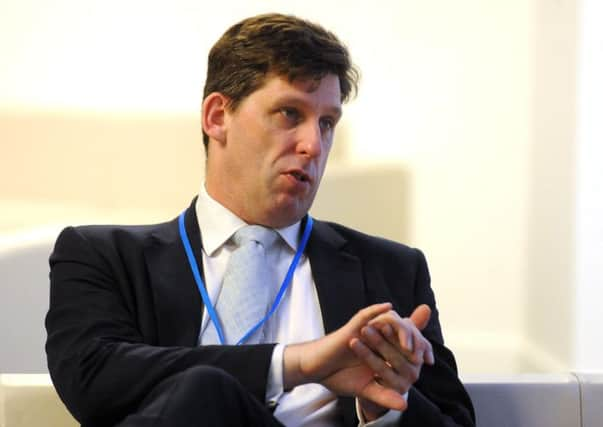SNP MP condemns decision to hand peerage to Tory candidate


Commons Leader Andrea Leadsom sidestepped questions over the appointment of Scottish Conservative MEP Ian Duncan as a new Scotland Office minister, despite losing out on a Westminster seat to SNP veteran Pete Wishart in the General Election.
Mr Wishart, SNP Commons leader, railed against the appointment and urged ministers to avoid filling the House of Lords with “cronies, donors and failed leadership candidates”.
Advertisement
Hide AdAdvertisement
Hide AdSpeaking during the Commons business statement, Mr Wishart said: “What’s appalling about my situation is the Conservative candidate that I defeated is soon to find himself ennobled as an unelected Lord, drafted into government as a Scottish Government minister.
“A total affront to democracy and an insult to my constituents who just so recently rejected him.
“Will the Leader of the House pledge never to use the House of Lords as a receptacle for cronies, donors and failed leadership candidates?”
Ms Leadsom, in reply, said: “On the subject of those who are ennobled, there are obviously decisions taken on merit and also on the grounds of political contribution right across the public sector of people who have given many years service to the public sector, and I think that as a matter is not for us.
“It is a matter for discussion at another time.”
Mr Duncan spent seven years working in the Scottish Parliament’s office in Brussels, and also served as European adviser to the Parliament and clerk to the European and External Relations Committee before becoming an MEP.
Mrs May, appearing at the summit just days after talks opened between Brexit Secretary David Davis and the EU’s chief negotiator, Michel Barnier, said there would be other issues on the agenda, including counter-terrorism.
“One of the things that I will be calling on with other European leaders today is that we do more working together to ensure that we stop the spread of extremism on line, that we prevent terrorists from having a safe space online and we keep our citizens safe,” she said.
Ahead of her visit, Foreign Secretary Boris Johnson said he hoped leaders of the 27 other nations would match her “generous” proposals to guarantee the rights of EU nationals with a similar offer to the British expats on the Continent.
Advertisement
Hide AdAdvertisement
Hide Ad“What the Prime Minister will be able to do on Thursday is set out, as she has tried actually to do several times, her instinct to be generous about the 3.2 million EU citizens who are living here and hoping that there will be reciprocal, corresponding generosity towards the one million UK nationals in the rest of the EU,” he said.
“I think she’s got a great offer to make and I hope it will go down well.”
The 27 remaining members will also hear a report from Mr Barnier on his talks with Mr Davis earlier this week, when the Brexit Secretary accepted a European timetable to put off talks on a future trade relationship until progress has been made on the terms of the divorce.
In a two-day summit whose agenda is formally dominated by immigration, security and the economy, Mrs May will also brief her counterparts on the UK’s commitment to a new £75 million plan designed to stem the flow of illegal migrants from Africa to Europe.
The three-year programme will offer humanitarian support, including food and water, to would-be migrants on the perilous transit routes from the Horn of Africa and western Africa through countries including Niger, Egypt and Libya.
And migrants who find themselves stranded and destitute along the routes will be offered assistance to return home.
While any assisted returns will be voluntary, it is thought that many individuals could take advantage of the scheme as a way of escaping the gruelling conditions of the transit routes, which expose them to the risk of death, violence, forced labour and exploitation at the hands of people-traffickers before they even reach Mediterranean Sea ports.
A record 4,576 people are thought to have died or been recorded missing while attempting the risky central Mediterranean Sea crossing during 2016.
Advertisement
Hide AdAdvertisement
Hide AdSome 181,000 people arrived in Italy via this route last year, with a greater number expected in 2017.
International Development Secretary Priti Patel said: “The UK has been at the forefront of responding to the migration crisis and our work to date has helped reduce total migrant numbers to Europe since 2015.
“But, worryingly, more and more people are now using the incredibly dangerous central Mediterranean route.
“This new UK support will provide desperately needed aid and protection to tens of thousands of the world’s most vulnerable.
“But, critically, it will also make clear the massive risks involved at every stage of this route and provide alternatives so those who change their minds can return home.
“As well as saving lives, this will provide vulnerable people with meaningful alternatives to the treacherous crossings into Europe.
“Building on our existing work to deal with the root causes of migration, this approach is about using our aid in a smart way, as part of a co-ordinated approach across Government, to provide protection to people who need it and serve Britain’s national interests.”
